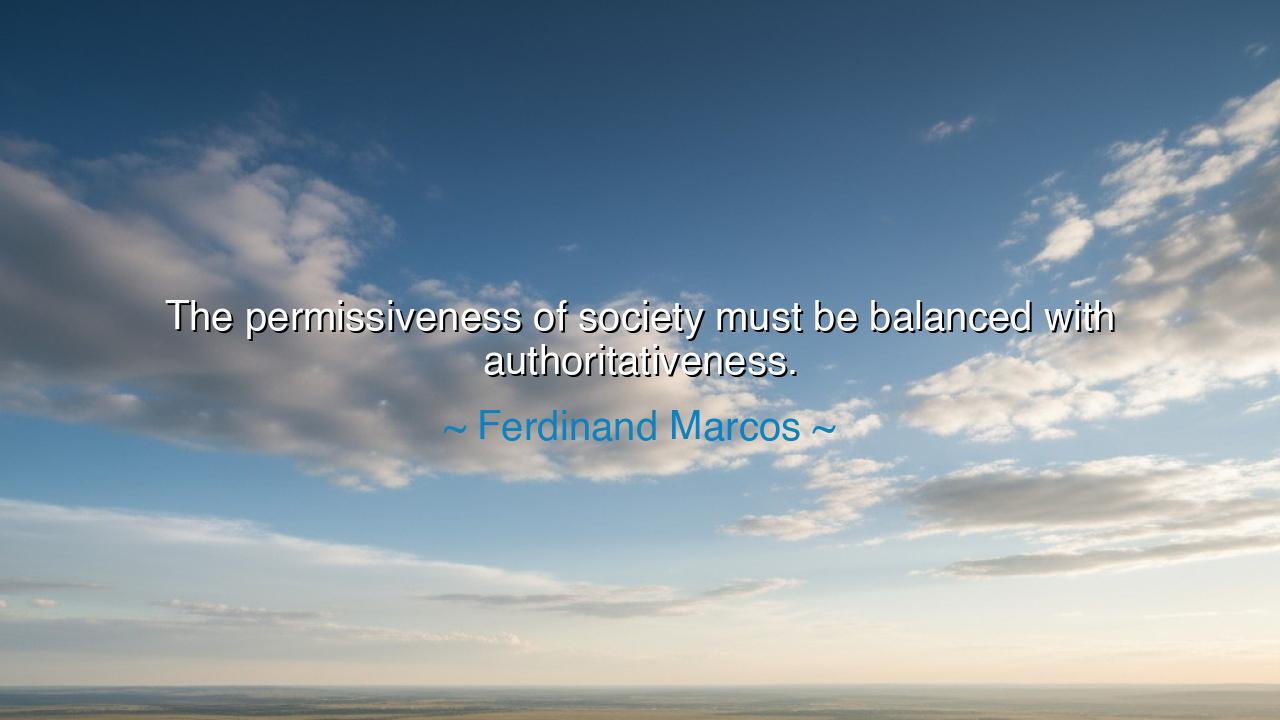
The permissiveness of society must be balanced with






Ferdinand Marcos, ruler of the Philippines and a man whose words were often bound to power, once declared: “The permissiveness of society must be balanced with authoritativeness.” These words, though spoken by one who wielded authority with a heavy hand, reveal an ancient tension that has shaped civilizations across the ages: the struggle between freedom and order, between indulgence and discipline, between the rights of the individual and the responsibilities owed to the whole.
The meaning of his words is rooted in the balance of opposites. Permissiveness represents liberty, the allowing of human desires, voices, and choices to flourish without constraint. It is the fertile soil in which art, innovation, and individuality take root. Yet unchecked, permissiveness can lead to excess, chaos, and the weakening of moral or civic bonds. Authoritativeness, on the other hand, signifies structure, rule, and the guiding hand of discipline. It ensures order, safety, and continuity. But when carried to extremes, it hardens into tyranny. Marcos speaks of a balance, for a society leaning too far toward either pole risks its own destruction.
History offers many warnings. In ancient Rome, during the late Republic, permissiveness grew rampant among the elites: feasts of excess, corruption in office, and a disregard for discipline. The people clamored for bread and spectacle, while leaders abandoned virtue for ambition. Out of this chaos rose Caesar and, with him, the heavy hand of empire. Rome shifted from liberty to authoritativeness, finding stability, but at the cost of the Republic’s freedom. Here is the lesson: imbalance invites reaction, and the pendulum swings from indulgence to control.
Yet there are stories where balance was achieved. Consider the age of Solon in Athens. Faced with unrest between rich and poor, Solon enacted reforms that limited permissiveness in greed yet prevented the cruelty of absolute power. He redistributed debts, gave voice to the common people, and restrained the aristocrats. His authoritativeness tempered freedom, and his permissiveness softened authority. Thus, Athens gained stability and a foundation for its later flowering. This is the vision Marcos’s words point toward, though his own rule often betrayed it.
But Marcos’s warning cannot be separated from his own time. He uttered it during an age when he declared martial law, justifying authoritativeness as the medicine for a society he claimed had become too permissive—too free with dissent, too restless with rebellion, too vulnerable to disorder. Yet we must see the danger here: when rulers use balance as a pretext, they may tip the scales heavily toward their own control. What he spoke of as “balance” often became justification for silencing critics, curbing freedoms, and extending his power. The words remain true in principle, but they also remind us that leaders may invoke wisdom while pursuing domination.
The lesson for us is therefore twofold: yes, balance is essential—for neither unrestrained liberty nor unchecked authority can sustain a nation. But we must be ever watchful of those who claim to guard this balance. True authoritativeness must be rooted in justice, not in fear. True permissiveness must be anchored in responsibility, not in indulgence. Only when both are held in harmony can a people flourish without collapsing into chaos or oppression.
Practical action lies in vigilance and virtue. As individuals, we must cherish freedom but temper it with self-discipline. As citizens, we must respect authority but demand accountability from those who wield it. Teach your children that liberty without restraint becomes ruin, and authority without compassion becomes tyranny. Practice balance in your own home, your community, your voice. In this way, you live the wisdom Marcos spoke of—purified of its abuse—so that society may walk the middle path, strong, stable, and just.
Thus, let his words be both a guide and a warning: “The permissiveness of society must be balanced with authoritativeness.” Remember always that extremes destroy, but balance preserves. The fire of freedom must be tended by the vessel of discipline, and the vessel must never smother the flame. Only then does a nation endure, and only then does a people walk in dignity through the ages.






AAdministratorAdministrator
Welcome, honored guests. Please leave a comment, we will respond soon